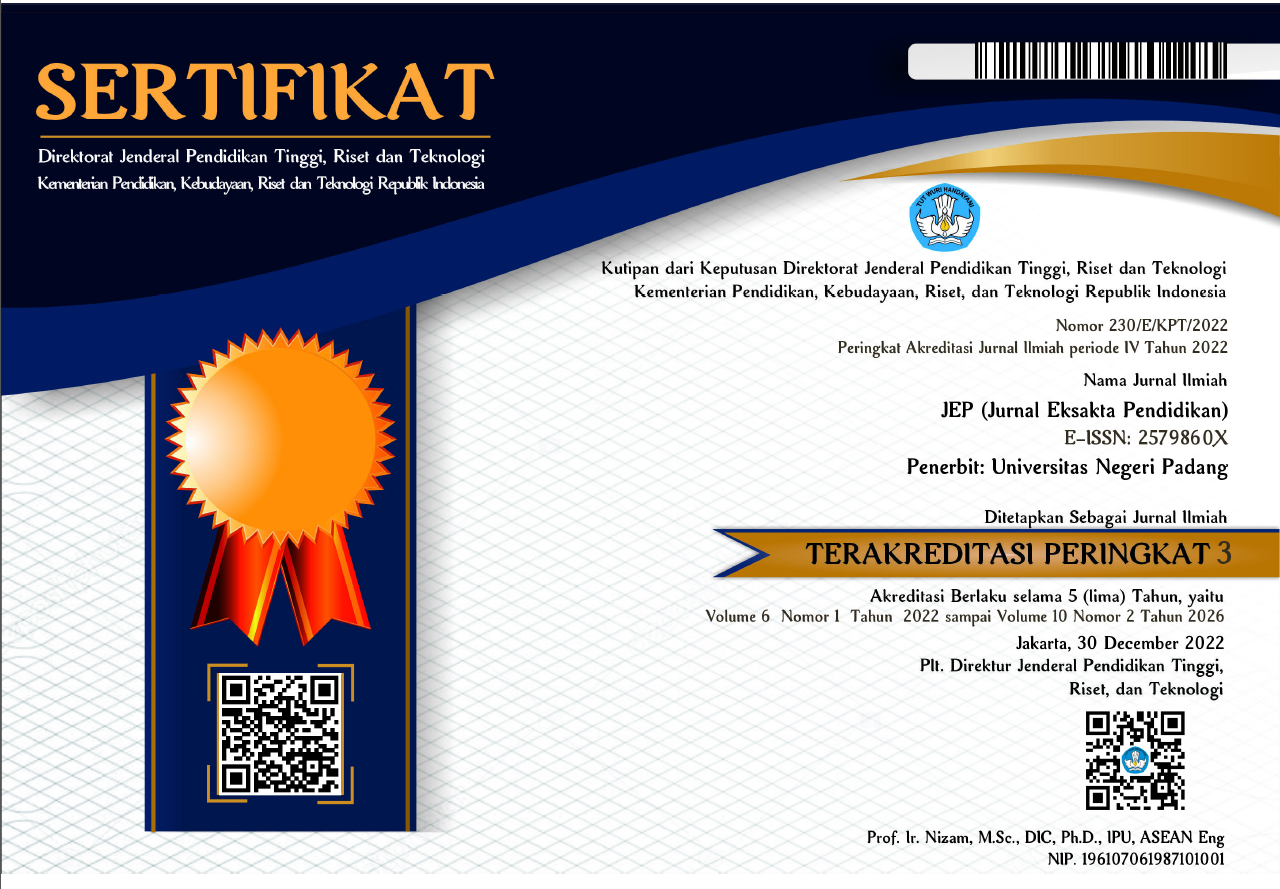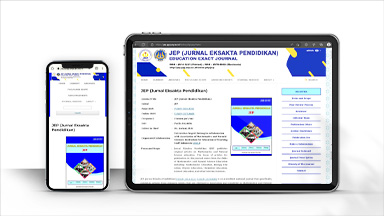Dampak Perangkat Pembelajaran Matematika Berbasis Kompetensi Profesi Terhadap Kemampuan Pemecahan Masalah Siswa Bidang Keahlian Teknologi Informasi dan Komunikasi
Abstract
This study discusses professional competency-based mathematics learning tools for vocational high school students. The purpose of this study is to produce a mathematics learning tool that refers to the field of communication and network engineering expertise, as an effort to overcome the difficulties faced by vocational school teachers in teaching mathematics. The research is a development research that refers to the development of the Plomp model with three stages, namely the preliminary research stage, the design stage and the assessment stage. In this article the results of the assessment phase will be discussed which examines the impact of devices that have been developed on students' problem solving abilities in the field of information and communication engineering. The results obtained are an increase in students' problem solving skills that can be seen in improving the ability to understand the problem, linking the problem with the concept that has been learned, setting a solution strategy, using the strategy, checking back and summarizing the results. This ability is highly needed by vocational school students, because in their work they will face many problems that require all of these abilities. Another visible impact of student activities is an increase in student learning activities as indicated by the willingness and perseverance in completing a given task.
Downloads
References
Armiati (2018). Mengembangkan Higher Order Of Thinking Skill Siswa Sekolah Mene ngah Kejuruan Melalui Pembelajaran Matematika Berbasis Kompetensi Pro fesi. SEMNAS MAT STKIP SUMBAR
Bae Seh Y. et al. (2015). Mathematical Word Problem Solving Ability of Children with Autism Spectrum Disorder and Their Typically Developing Peers. Jour nal. J Autism Dev Disord DOI 10.1007/ s10803-015-2387-8.
Căprioară D. (2015). Problem Solving - Purpose And Means Of Learning Mathematics In School. Journal. Social and Behavioral Sciences 191 (2015) 1859 – 1864.
Fitra, R. dkk. (2016). Peningkatan Kemampuan Pemecahan Masalah Siswa SMK Mela lui Model Problem Based Instruction (PBI). Jurnal Didaktik Matematika. ISSN: 2355-5185. Vol 3, No. 2, Septem ber 2016.
Gonzalez, P. (2016). Improvement of Word Problem Solving and Basic Mathema tics Competencies in Students with Attention Deficit/ Hyperactivity Disor der and Mathematical Learning Difficul ties. Learning Disabilities Research & Practice, 00(0), 1–14. DOI: 10.1111/ ldrp.12106.
Karatas, I., & Baki, A. (2013). The Effect of Learning Environments Based on Prob lem Solving on Students’ Achievements of Problem Solving. International Elec tronic Journal of Elementary Education, 2013, 5(3), 249-268.
Kaya, D. dkk. (2013). The Investigation of Elementary Mathematics Teacher Candi dates’ Problem Solving Skills Accor ding to Various Variables. International Electronic Journal of Elementary Educa tion, 2014, 6(2), 295-314.
Kompas. com. (2018). Alasan Lulusan SMK Banyak Menganggur. Diakses dari:
https://edukasi.compas.com/read/2018/04/26/15342831
Liputan6.com. (2017). Lulusan SMK Jadi Pengangguran Paling Banyak di RI. Jakarta. Diakses dari:
https://www.liputan6.com/bisnis/read/3153245
Maawaddah, S., & Hana, A. (2015). Kemam puan Pemecahan Masalah Matematis Siswa pada Pembelajaran Matematika dengan Menggunakan Model Pembela jaran Generatif (Generatif Learning) di SMP. EDUMAT Jurnal Pendidikan Ma tematika, Vol. 3, No. 2.
Makhashova, P. (2016). On the Development of Professional Competence in Students of Creative Pedagogical Specialties. Inter national Journal of Environmental & Science Education. 2016, vol. 11, No. 11, 4660-4668.
Masdalipa, dkk. (2017). The Effect of Problem-Based Learning Assisted Concept Map to Problem-Solving Ability and Critical Thinking Ability”. Journal of Education and Practice. ISSN 2222-1735 (Paper) ISSN 2222-288X. Vol.8, No.19, 2017
Murtikusuma, R. P. (2015). Pengembangan Perangkat Pembelajaran Matematika Model Problem Based Learning Berban tuan Media Powerpoint Untuk Siswa Kelas XI SMK Materi Barisan dan Deret. Saintifika; Jurusan PMIPA, FKIP, Universitas Jember. P-ISSN: 1411 -5433. E-ISSN: 2502-2768.
Omarov, Y. B. dkk. (2016). Methods Of Forming Professional Competence Of Students As Future Teachers. Inter national Journal of Environmental & Science Education. 2016, VOL. 11, NO. 1 4, 6651 -6662.
Ӧzsoy, G dkk. (2015). Evaluation of Student’s Mathematical Problem Solving Skill in Relation to Their Reading Levels. International Electronic Journal of Ele mentary Education. Vol. 8, No. 1. Hal 581-600. 2015.
Plomp, T & Nieven N. (2013). Educational Design Research-Part A: An Introduc tion Enschede: Netherland Institute for Curriculum Development (SLO) PQ4R Strategy Accompanied by Refutation Text reading
Purwanto, N. (2009). Prinsip-prinsip dan Teknik Evaluasi Pengajaran. Bandung: Remaja Rosdakarya.
Rajotte, T. dkk. (2016). Evaluation of the Effect of Mathematical Routines on the Deve lopment of Skills in Mathematical Prob lem Solving and School Motivation of Primary School Students in Abiliti-Témiscamingue. Universal Journal of Educational Research 4(10): 2386-2391, 2016. DOI: 10.13189/ujer.2016. 041017.
Raharjanti, M. (2011). Pengembangan Perang kat Pembelajaran Operasi Matriks Bero rientasi Pendekatan Pemecahan Masa lah di SMK Program Keahlian Tata Niaga Kelas XII. Fakultas Keguruan Dan Ilmu Pendidikan Universitas Jember.
Rahmadhani, S. (2012). Pembelajaran Matema tika dengan Pendekatan Problem Posing untuk Meningkatkan Kemam puan Pemecahan Masalah dan Koneksi Matematis Siswa. Bandung: UPI. Dikutip dari Repository. UPI.Edu.
Rahmawati, E. dkk. (2013). Pengembangan Perangkat Pembelajaran Matematika Bilingual Melalui Model Pembelajaran Berbasis Masalah (Problem Based Instruction) Pada Sub Pokok Bahasan Persegi Panjang dan Persegi kelas VII. Kadikma, Vol. 4, No. 3, hal 81-90, Desember 2013.
Sangpom, W. et al. (2016). Advanced Mathe matical Thinking and Students’ Mathe matical Learning: Reflection from Stu dents’ Problem-Solving in Mathema tics Classroom. Journal of Education and Learning; Vol. 5, No. 3; 2016 ISSN 1927-5250 E-ISSN 1927-5269.
Published by Canadian Center of Science and Education.
Siska R M. (2015). Pengaruh Penggunaan Metode Student Facilitator And Ex plaining Dalam Pembelajaran Koope ratif Terhadap Kemampuan Peme cahan Masalah Matematik Siswa SMK di Kota Tasikmalaya. Jurnal Penelitian Pendi dikan dan Pengajaran Matema tika. Vol. 1 no.1
Subekti, FE. (2014). Pengembangan Perangkat Pembelajaran Matematika Kelas X SMK dengan Model Problem Solving Heuristic Berprinsip Pengelolaan Labo ratorium Teenzania. Jurnal Euclid, ISSN 2355-1712, vol.1 , No.2, pp. 60-136. 2014.
Ulu, M. (2017). The Effect of Reading Compre hension and Problem Solving Strategies on Classifying Elementary 4th Grade Students with High and Low Problem Solving Success. Journal of Education and Training Studies. Vol. 5, No. 6; June 201 7. ISSN 2324-805X E-ISSN 2324-8068. Published by Redfame Publishing.
Yuniarti, T. (2014). Pengembangan Perangkat Pembelajaran Berbasis Masalah (Prob lem Based Learning) Dengan Pende katan Ilmiah (ScientificApproach) Pada Materi Segitiga Kelas VII SMP Se-Kabupaten KaranganyarTahun Pelajaran 2013/2014. Jurnal Elektronik Pembela jaran Matematika.Vol.2, No.9, hal 911-921, November 2014. ISSN: 2339-1685.
Yustianingsih, R. (2017). Pengembangan Perang kat Pembelajaran Matematika Berbasis Problem Based Learning (PBL) Untuk Meningkatkan Kemam puan Pemecahan Masalah Peserta Didik Kelas VIII. Jurnal; JNPM (Jurnal Nasional Pendi dikan Matematika). September 2017 Vol. 1, No. 2, Hal. 25
Copyright (c) 2020 Armiati Armiati, Hestu Tansil La’ia

This work is licensed under a Creative Commons Attribution 4.0 International License.

This work is licensed under a Creative Commons Attribution 4.0 International License.




_(2579-860X).png)
_(2614-1221)1.png)




